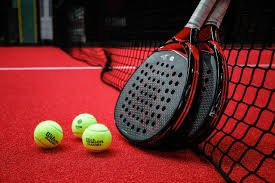Dubai is ablaze with a new sporting passion: padel. Once a niche activity, this fast‑paced, social racquet sport has surged in popularity, reshaping leisure culture and inspiring fresh approaches in sporting infrastructure. As it flourishes in the UAE, India stands to gain key lessons—if it can adapt smartly.
Why Dubai Loves Padel
Dubai now boasts over 250 padel courts—more than enough to make it the city’s fastest‑growing sport ). Built in clubs, villas, even in landscaped plazas, these venues are as social as they are athletic. Many courts feature cafes, lounges, and fitness hubs, transforming each match into a communal event . Padel is easy to pick up, low‑impact, and instantly addictive—a winning combo for any fast‑living city .

Key Takeaways for India
1. Community‑Centric Design
Dubai’s success isn’t just about courts—it’s about creating pulses of community. Integrated venues let players linger, mingle, and engage. Indian club and city planners can apply this model: build courts with social hubs to make padel part sport, part gathering.

2. Accessibility & Affordability
Dubai courts range from public free spaces to premium clubs. India needs a similar range: from budget-friendly open‑to‑public courts to high‑end private clubs. With courts available in Mumbai, Delhi, Bangalore, Hyderabad—and over 100 nationally—they’re building fast. Focus on affordable booking and accessible coaching to democratize the sport.
3. Infrastructure Investment
Dubai shows results when infrastructure aligns with interest. Indian firms like PadelPark are already leading the way—managing 70% of the country’s courts, with professional academies, coaching, and retail rolled into the package . A unified, infrastructure-first strategy could mirror the UAE’s speed in scaling popular appeal.


4. Leverage Celebrity & Social Media
In the UAE, expats and locals alike promote padel’s social lifestyle. In India, A‑listers like Sonam Kapoor and Dino Morea are already showing their racket skills. Amplifying this with targeted campaigns—featuring celebrities, cricketers, and fitness influencers—can supercharge adoption.
5. Grassroots & Tournament Strategy
Dubai hosts regular events that mix amateurs and professionals, cementing its sporting buzz. India has begun too: the Indian Padel Tour, FIP‑recognized events, and growing junior leagues. To match Dubai, India should expand regional tournaments, offer prize money, and create visibility—making padel aspirational and credible.
The Growing Indian Padel Landscape
- Rapid growth: 159% spike in participation between 2019–2022
- Court count: from one court in Bangalore (2017) to 100+ nationwide by mid‑2024
- Organizational push: The Indian Padel Federation ranks national events and aims for Sports Authority recognition
- Infrastructure & ecosystem: PadelPark oversees court construction, coaching, equipment, tournaments—and even pro league planning
Facing Challenges
- High upfront and per‑play costs – courts cost ₹18–25 lakh each; rackets and gear stay premium
- Land constraints in metros – challenge affordability; tier‑2/3 cities offer cheaper land and smarter scaling
- Niche perception – as Redditers point out, padel still feels elite. India must shape it as inclusive, fun, and accessible
- Professional pipeline needed – currently few full‑time players; coaching and tournament structure is still emerging

Recommendations for India
| Area | Strategy |
|---|---|
| Make it Social | Build courts with lounges; let non‑players socialize |
| Expand Access | Subsidize community courts; partner with schools and colleges |
| Push Grassroots | School programs + junior circuits to nurture talent |
| Amplify Media | Celebrity matches; social content; partner with brands |
| Professionalize | Pro leagues, FIP tournaments, central coaching cadres |
| Smart Expansion | Target tier‑2/3 markets to optimize costs and adoption |
Conclusion
Dubai’s whirlwind ascension in padel tells a powerful story: sport grows fastest when it’s accessible, enjoyable, and socially embedded. India already hits many of those notes—but could massively accelerate by intentionally scaling access, leveraging culture, and backing professional pathways. With thoughtful strategy, India won’t just import Dubai’s padel craze—it could lead it.
Do follow UAE Stories on Instagram
From Ports to Policies: How Dubai Is Transforming Global Trade Forever















